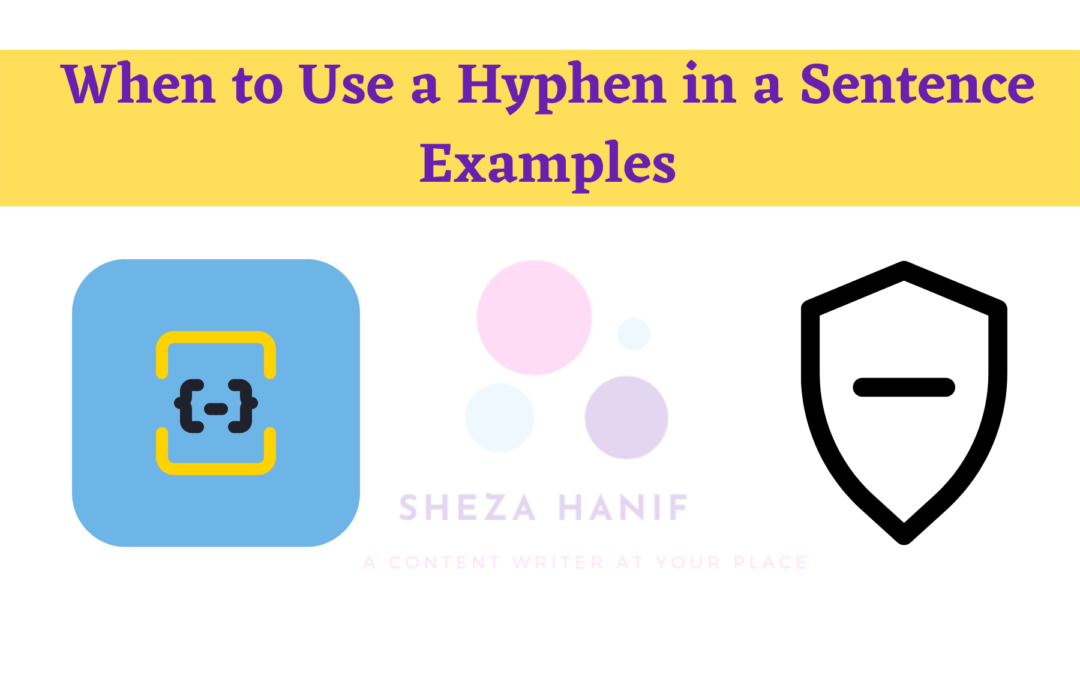Do you know when to use a hyphen in a sentence with examples?
- A hyphen ( -) is a punctuation mark that connects words or parts of words. It’s not interchangeable with the other types of dashes.
- When a compound modifier comes before the word it modifies, use a hyphen.
- Check your favorite dictionary to see whether a compound word contains a hyphen or not.
How to Use Hyphens with Compound Modifiers?
It’s simple to connect words with hyphens. Picking the correct words to link together is a little more complicated. Compound modifiers are our first stop.
A compound modifier is a pair of words that function like one adjective. When you connect terms with a hyphen, you convey to readers that they are meant to be used together.
When rebuilding, it’s best not to take down any load bearing walls.
It appears that you should not take down any load that is bearing walls in this statement. To ensure clearness, insert a hyphen between “load” and “bearing.”
- When rebuilding, it’s best not to take down any load-bearing walls.
- We’re looking for a dog-friendly hotel.
- This rock-hard cake is impossible to eat.
The hyphen is required only if the two words are used as an adjective before the noun they’re describing. If the word comes first, don’t use a hyphen.
- It’s impossible to eat this cake since it’s rock hard.
- Is this hotel pet friendly?
- This wall is load bearing.
When your modifier consists of an adverb and an adjective, you don’t need a hyphen.
- Do you expect me to believe this utterly-unbelievable story?
- Do you expect me to believe this utterly unbelievable story?
Hyphen with Principles
When to use a hyphen in a sentence with examples? Follow the same rules as any other compound modifier when used with a present or past participle.
Hyphen With a Present Participle, Adverb Or Adjective, and a Noun
When we join a noun or adjective with a present participle to make a unit of meaning that denotes another word, use a hyphen to make the distinction clear.
There are some beautiful looking trees in the garden.
Without the hyphen, your reader may become perplexed by the sentence. Perhaps there’s a new variety of trees called “the looking tree”?
- There are some beautiful-looking trees in the garden.
- When one has a headache, fast-acting medications can be beneficial.
When the modifier follows the noun it is describing, don’t use a hyphen.
- These medications are fast acting.
When you use a hyphen to join two adverbs together, don’t do it.
- The room was like a nicely-decorated chocolate box.
- The room was like a nicely decorated chocolate box.
The Hyphen in a Compound Expression with Past Participle and a Noun
A compound modifier that includes a past participle must also follow the same criteria as any other compound modifier. When the compound comes before the noun it modifies, use a hyphen:
- This evening, a well-known local performer will take the stage.
- Meat-fed cats are often regarded as relatively healthy by veterinarians.
- Wind-powered generators can produce a lot of electricity.
- The municipal administration is investing in a community-based education system.
When the compound follows the noun it modifies, don’t use a hyphen.
- The performer taking the stage is well known.
Hyphenated Compound Words
The ones with a hyphen between the words are called hyphenated compound words. Many hyphenated compounds become closed compounds over time, such as teen-ager became teenager. If you’re confused whether to use a hyphen, look it up in a dictionary. When to use a hyphen in a sentence with examples? Here are some examples of well-known hyphenated compound phrases:
- Twelve-pack
- Factory-made
- Ten-year-old
- Editor-in-chief
- Master-at-arms
- Mother-in-law
Closed Compound Words
On the other hand, hyphenated words often develop into closed compounds (words with no hyphens) over time. Email rather than e-mail is becoming more widespread every day. If you’re unsure whether a word is a closed compound or a hyphenated one, look it up in your favorite dictionary.
- Fireman
- Bookstore
- Waistcoat
- Superman
- Notebook
Open Compound Words
Compounds are usually made up of two nouns that are used together to represent a single concept. “Open” implies a gap between the two words, and no hyphen is used. A good dictionary is an essential tool for determining whether or not a compound is open.
- Coffee mug
- Dinner table
- Real estate
- Living room
Hyphens and Numbers
When words are spelled out, numbers between twenty-one and ninety-nine should be hyphenated.
- I’ve got twenty-two widgets to sell.
- No, I don’t like to play “like it’s nineteen ninety-five.”
Hyphen with Numbers in Compound Adjective
When numbers are used as the first component of a compound adjective, they should be connected with a hyphen to the noun that follows them. This way, the reader understands that both terms function together as a unit to modify another term. Whether it’s in words or figures, this rule applies whether or not there is a space between the number and the word following.
- He is an expert on thirteenth-century politics.
- The youngster threw a stone through the second-story window.
- The president of the firm made a 10-minute address to the Board of Directors.
However, if the number is the second word in a compound adjective, there is no need for a hyphen.
- The elevator does not go down to Basement 3.
- He has Type 2 diabetes.
Hyphen with Fractions in Compound Adjective
When a fraction (e.g., quarter or half) is used to construct a compound adjective, it should be hyphenated to avoid confusion among the reader as to which fraction is being modified by which noun.
- A quarter-million-dollar is still a significant sum of money.
- One-third of a pound of flour and one cup of milk is required.
- That’s a half-baked idea, to say the least!
Hyphen with Prefixes: All-, Self-, Ex-
Precede the prefix ex- (meaning “former”) with a hyphen.
- Don’t put Adam next to Martha, his ex-wife!
- Despite no longer being in office, the ex-mayor still showed up for all of the town’s events.
Consider using a hyphen to connect the reflexive prefix self- with an adverbial phrase.
- The cat, who had been lazing in the vicinity of the plant he had knocked over and eaten, appeared to be quite self-satisfied.
- Do you prefer a self-service or a full-service gas station?
Try not to confuse the noun “self with the prefix “self.”
- The self is alone.
To put it another way, you should always use all as a preposition and hyphenate it.
- It’s a poor leader who considers himself to be all-powerful.
Hyphens with Low or High
When a high- or low-level/low-impact compound adverb comes before the noun, it modifies, use a hyphen. High-level/low-level and high-impact/low-impact are examples of compound adjectives that use high and low.
- Low-flying planes add to the noise in the vicinity.
- Many low-income families are under a lot of pressure, which is not uncommon.
- This automobile requires high-grade gasoline to function correctly.
- One of the most excellent methods to save money is to use a high-interest savings account.
That’s all about when to use a hyphen in a sentence with examples. I hope you have found this article helpful. For more articles, visit our blog. And don’t forget to subscribe to our YouTube channel.

